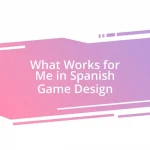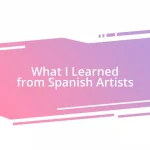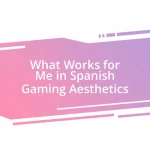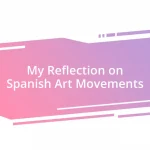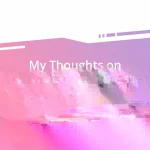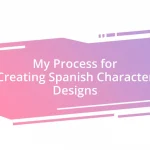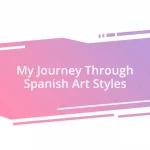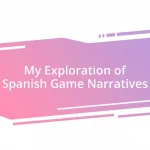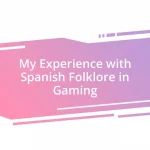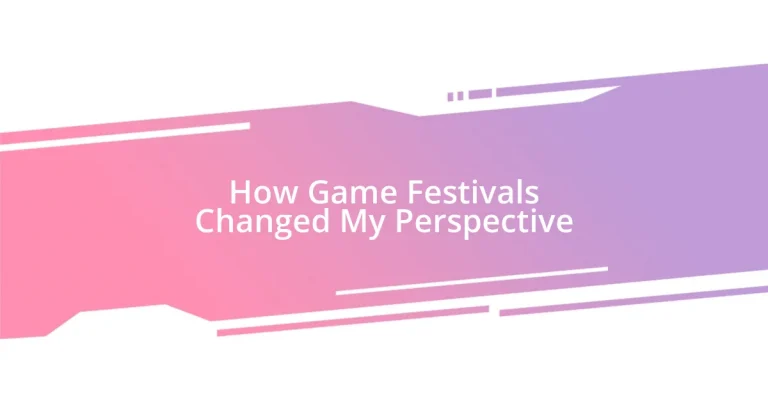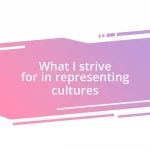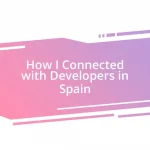Key takeaways:
- Game festivals foster a strong sense of community, facilitating deep connections and collaborative projects among creators and fans.
- Networking opportunities at these events lead to valuable insights from industry leaders and potential partnerships that can spark creativity.
- Attending festivals enhances appreciation for diverse game genres and narratives, while personal experiences shared during discussions promote emotional growth and innovation.
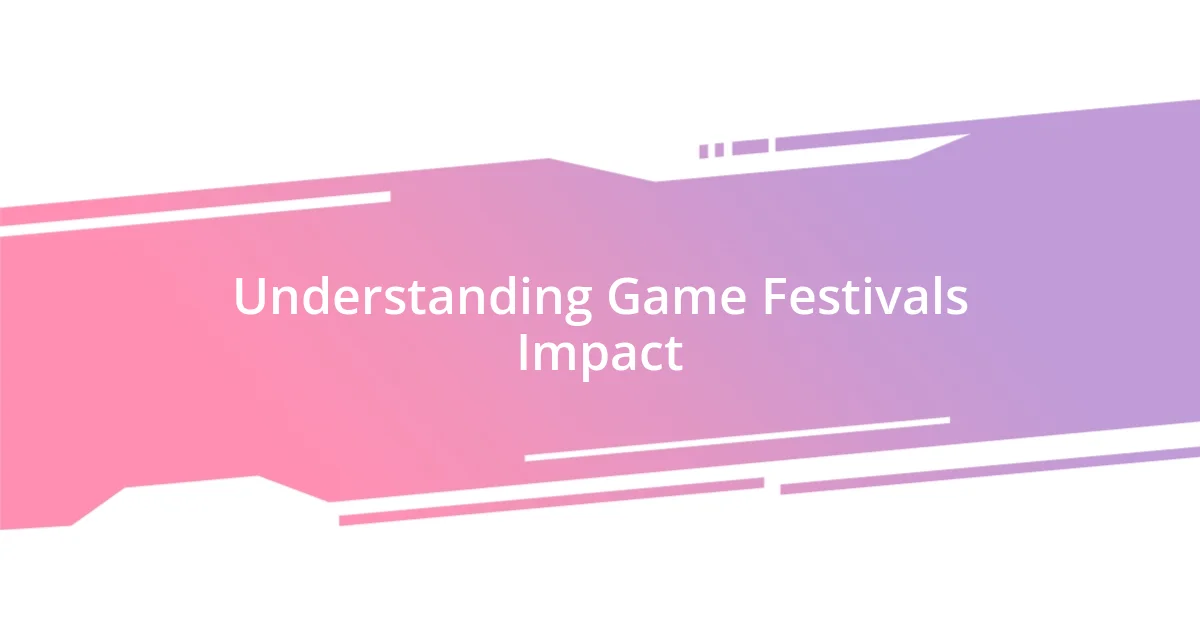
Understanding Game Festivals Impact
Attending game festivals has a significant way of reshaping one’s perspective on both gaming and community. I still remember my first festival; the sheer diversity of creators and players gathered in one space opened my eyes to the vast potential of gaming as a collaborative art form. Have you ever felt that rush of connection with people who share your passions? It’s an experience that truly highlights the communal spirit that gaming fosters.
The impact of these festivals goes beyond just entertainment; they become platforms for discussion and innovation. At a recent event, I found myself in a workshop that tackled mental health in gaming. Listening to stories from developers about their struggles and triumphs made me realize how deeply interconnected our experiences are. It was a profound reminder that every pixel and storyline can carry meaningful narratives reflective of real-life challenges.
On another note, I often wonder how these events impact the gaming industry as a whole. Witnessing independent developers showcase their work often sparks inspiration and encouragement for others to take risks. It’s a domino effect; one brave creator’s passion project can ignite ideas in countless others, expanding the boundaries of what games can be. It’s truly magical to see creativity flourish in such an encouraging atmosphere.
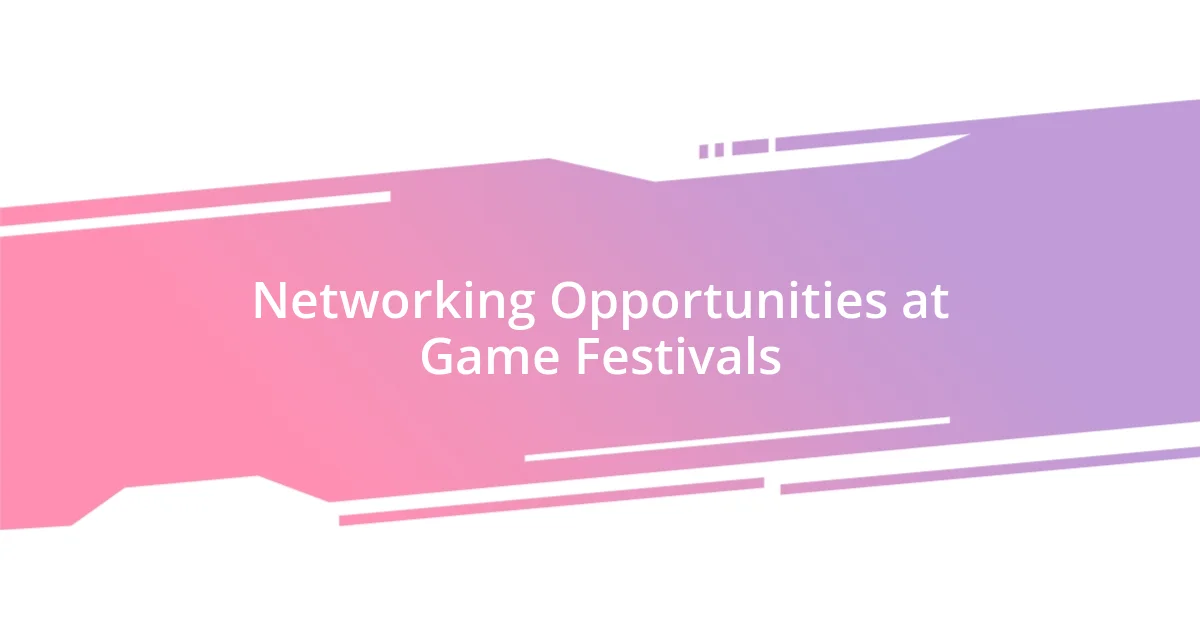
Networking Opportunities at Game Festivals
Networking at game festivals has been an eye-opening experience for me. I’ll never forget the time I bumped into a game developer whose project was inspired by folklore from their homeland. The conversation flowed effortlessly, and we exchanged contact information, sparking a collaborative project that blended our artistic visions. It truly reinforced the idea that these festivals are not just about showcasing games but about creating connections that lead to incredible opportunities.
Here are some ways game festivals enhance networking:
- Meet Industry Leaders: I had the chance to chat with directors from major gaming studios. Their insights into the industry were invaluable.
- Participate in Panels: Attending panels allows for spontaneous networking opportunities as passionate individuals come together to exchange ideas.
- Collaborative Workshops: These hands-on sessions often lead to partnerships or friendships, as you’re working side by side with like-minded creators.
- Casual Social Events: After-hours mixers provide a relaxed atmosphere to bond over shared interests, sometimes leading to unexpected collaborations.
Every interaction at these festivals feels like planting a seed for future projects, and the excitement of uncertain possibilities is something I cherish deeply.
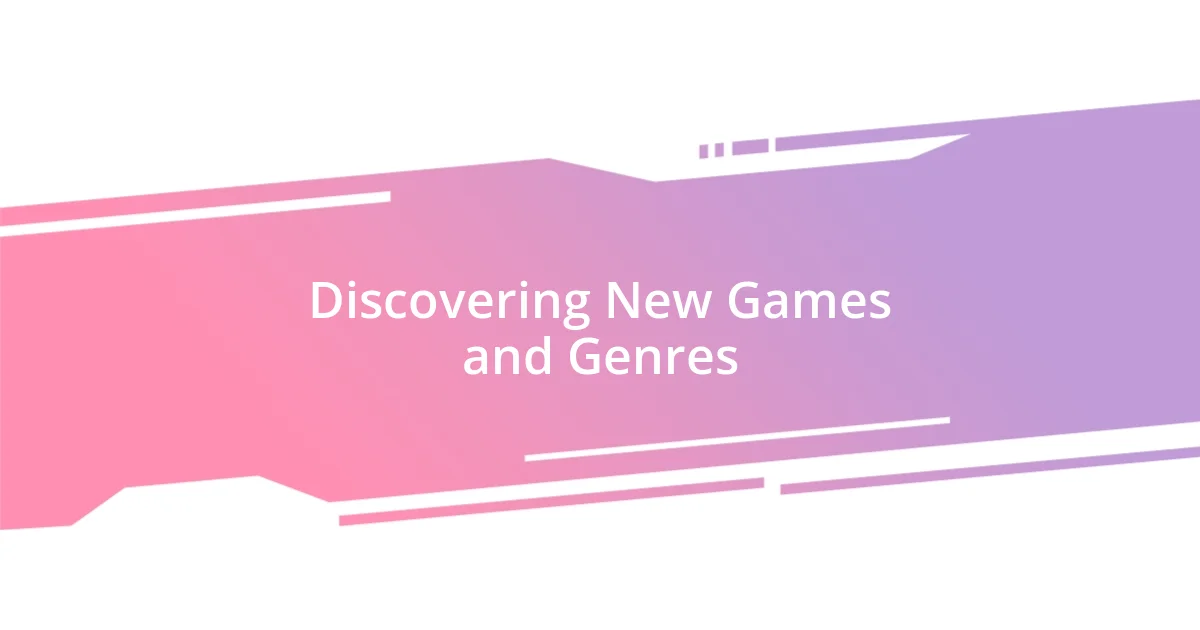
Discovering New Games and Genres
Discovering new games and genres at game festivals is always an adventure for me. I vividly remember stumbling across a booth showcasing a unique mix of puzzle-solving and platforming elements. It was a game I’d usually overlook, but the vibrant art style and engaging gameplay drew me in. After trying it out, I found myself hooked! This experience opened my eyes to niche genres that I previously hadn’t considered, illustrating how festivals serve as a gateway to unexplored gaming territory.
I also love participating in demo sessions where developers invite festival-goers to test their nascent projects. I recall one instance where I tried a rhythm-based game that combined music with adventuring—something I never thought I’d enjoy. The rush of hitting the right moves in sync with captivating tracks was exhilarating. It made me realize that this genre was not just a casual experience but could offer deep engagement and emotional connection.
Additionally, it’s fascinating to see how diverse the gaming landscape is becoming. Meeting a group of indie developers at a festival who were passionate about storytelling in games made me appreciate the varied narratives available in the medium. I found myself engaged in deep conversations about how games can tackle societal issues, igniting a newfound appreciation for games that incorporate meaningful themes. It’s these moments of discovery that reshape my understanding of what games can be.
| Game Genre | Festival Discovery Experience |
|---|---|
| Puzzle Platformer | Engaging art style led to an unexpected interest. |
| Rhythm Adventure | Experience showcased emotional engagement through gameplay. |
| Indie Story-Driven | Conversations sparked an appreciation for narrative depth. |

Insights from Industry Professionals
When I spoke with a seasoned game designer at one festival, I was struck by their emphasis on the importance of player feedback. They shared a story about how a seemingly trivial mechanic change, sparked by a player’s suggestion, transformed a game’s reception entirely. This conversation made me ponder—how often do we truly listen to what players are saying? I realized that fostering an open dialogue about game design can lead to not just better games, but community growth.
At another festival, a young developer candidly discussed the challenges of funding in the indie scene. Listening to their journey through grant applications and crowdfunding campaigns opened my eyes to the tenacity required to bring a vision to life. It made me question whether I, too, could cultivate that level of resilience in pursuing my projects. Their passion was infectious, showing me that every struggle can be a stepping stone to success and innovation.
In a workshop, a veteran sound designer explained how audio shapes player emotions in ways that visuals alone sometimes cannot. I remember thinking back to my own gaming experiences—how often did a haunting soundtrack elevate the narrative? Their insights on sound layering highlighted how critical these elements are in creating memorable moments. It left me inspired to think more holistically about all aspects of game development and how they intertwine to evoke feelings.
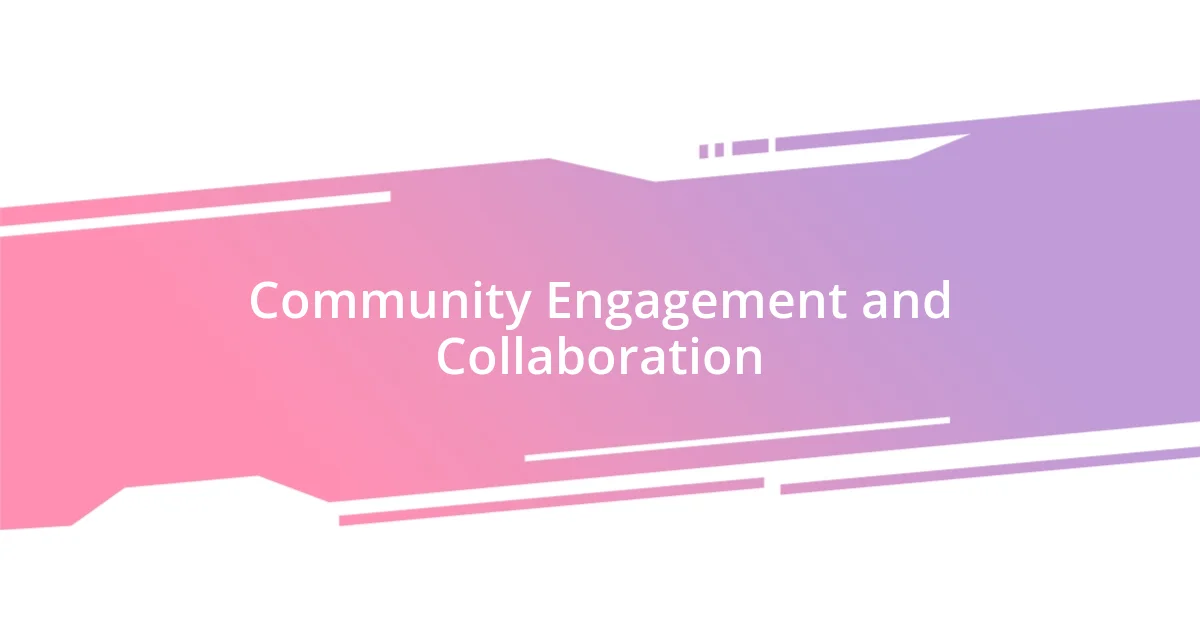
Community Engagement and Collaboration
Participating in game festivals has taught me the true power of community engagement. I remember attending a roundtable discussion where fans and developers alike shared their gaming experiences. It felt incredible to hear someone describe how a particular game had positively impacted their life. Moments like this highlight how our shared passion for gaming can unite us, fostering connections that go beyond just pixels on a screen.
Collaboration is another significant aspect I’ve come to appreciate through these events. I once joined a local game jam at a festival, teaming up with people I’d never met before. We had different backgrounds and skills, yet our combined creativity led to the birth of a game prototype in just 48 hours. This experience opened my eyes to the magic that happens when diverse minds work together toward a common goal. Isn’t it fascinating how collaboration can spark innovation and push boundaries in ways we never thought possible?
Moreover, the sense of belonging within this community has resonated with me on a personal level. I vividly recall a festival where I attended a panel on mental health in gaming communities. Hearing other attendees share their struggles and triumphs made me feel less alone in my journey. It reinforced the idea that gaming isn’t just a solitary escape; it’s a collective experience that can support emotional well-being. Can you feel the strength of that connection? It’s a reminder that we’re all in this together, building a vibrant landscape through collaboration and shared experiences.
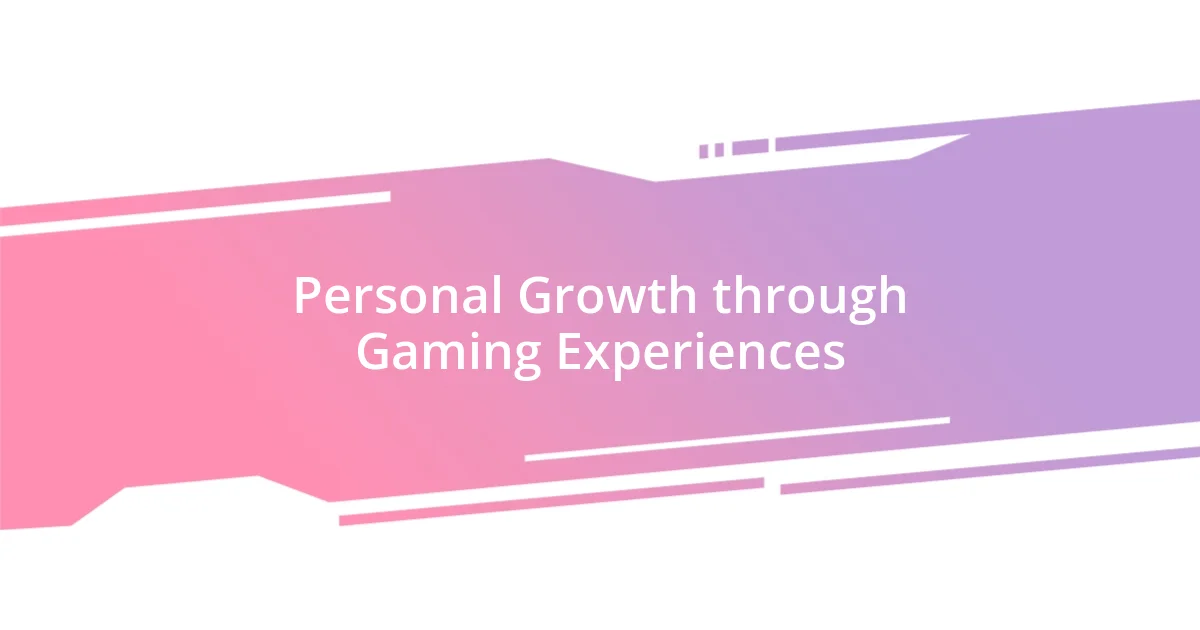
Personal Growth through Gaming Experiences
I can still recall the first time I stepped into a game festival and was welcomed by dozens of passionate gamers like myself. It was a powerful moment, realizing that my interests connected me with others who shared similar dreams and ambitions. This sense of belonging pushed me to step out of my comfort zone, sparking a desire to contribute creatively rather than just consume what was in front of me. Have you ever found your passion mirrored in the enthusiasm of others? That kind of shared energy can be a true catalyst for personal growth.
One memorable experience was during a panel discussion about storytelling in games. An indie developer shared how their struggles with anxiety fueled their narrative, transforming personal pain into a character that resonated with players. Listening to that story made me reflect on my own vulnerabilities and how they could be expressed through creativity. It was a powerful reminder that our struggles can drive innovation. Have you ever thought how your challenges can inspire unique stories or ideas? The truth is, embracing our experiences often leads to profound personal development.
I’ve also had the chance to participate in hands-on workshops that focused on game design fundamentals. I remember feeling completely lost at first, completely overwhelmed by the technical jargon. Yet, as I navigated through the process with fellow attendees, I realized our collective support transformed that fear into excitement. We were all learning together, and the environment fostered a sense of camaraderie that emboldened me to push through. Isn’t it amazing how shared experiences in a learning environment can help us break barriers? I left those sessions feeling not only more knowledgeable but also more confident about my creative abilities, ready to tackle whatever came next.
